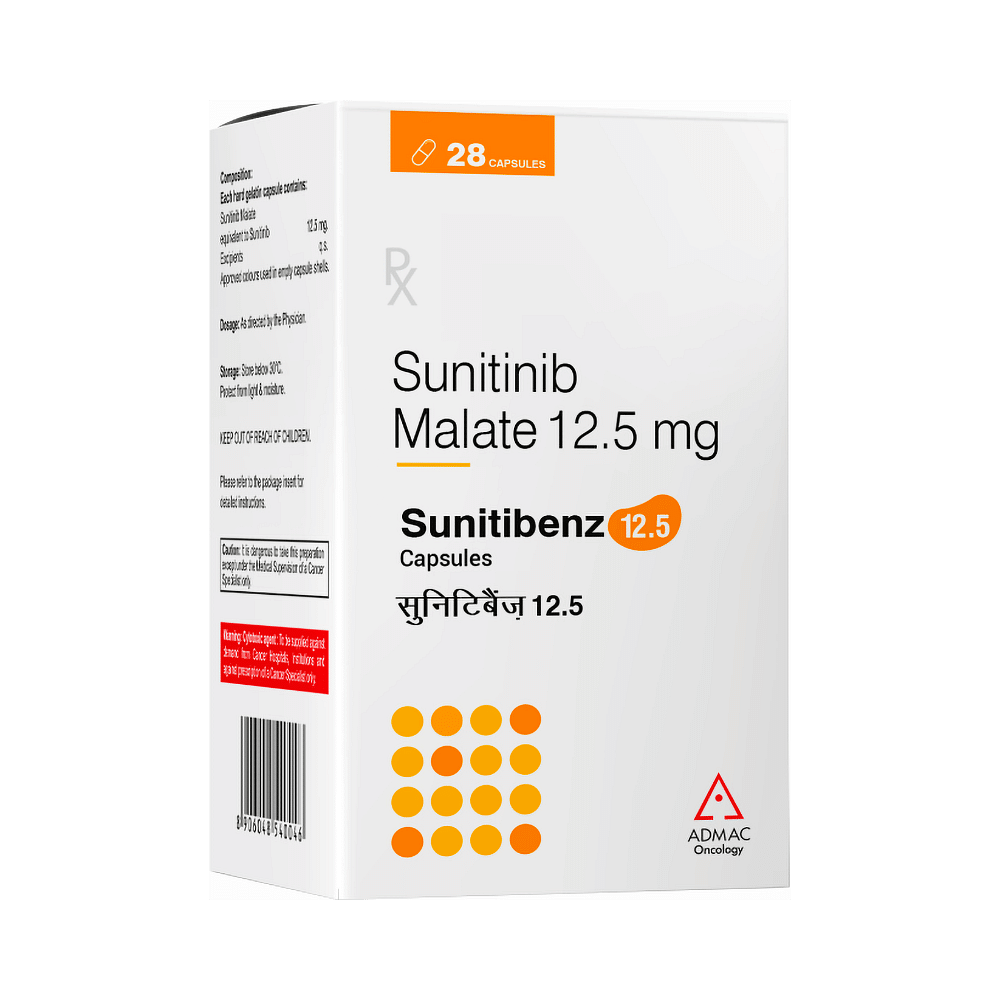
Sunitax 12.5 Capsule
Manufacturer
Aureate Healthcare Pvt Ltd
Salt Composition
Sunitinib (12.5mg)
Key Information
Short Description
Sunitax 12.5 Capsule is a medicine used in the treatment of kidney cancer and gastrointestinal stromal tumor.
Dosage Form
Capsule
Introduction
Sunitax 12.5 Capsule is an anti-cancer medication that works by blocking specific enzymes that promote the growth of cancer cells. It shrinks the tumor and slows down its progression.
Directions for Use
Take this medicine in the dose and duration as advised by your doctor. Sunitax 12.5 Capsule may be taken with or without food, but it is better to take it at a fixed time.
Safety Information
Side Effects
Diarrhea may occur as a side effect. Drink plenty of fluids and inform your doctor if it doesn't stop or if you find blood in your stools.
Alcohol Warning
It is not known whether it is safe to consume alcohol with Sunitax 12.5 Capsule. Please consult your doctor.
Breastfeeding Warning
Sunitax 12.5 Capsule is probably unsafe to use during breastfeeding. Limited human data suggests that the drug may pass into the breastmilk and harm the baby.
Pregnancy Warning
Sunitax 12.5 Capsule may be unsafe to use during pregnancy. Although there are limited studies in humans, animal studies have shown harmful effects on the developing baby. Your doctor will weigh the benefits and any potential risks before prescribing it to you. Please consult your doctor.
How it works
Sunitax 12.5 Capsule is an anti-cancer medication that works by binding and blocking certain cell surface protein (tyrosine kinase) responsible for the propagation of cancer growth. It also restricts the growth of new blood vessels within the tumor.
Quick Tips
Use a reliable contraceptive method to prevent pregnancy while you are taking this medicine and for a month after you stop taking it. It may affect wound healing time. Be careful while shaving, cutting fingernails or toenails, or using sharp objects. In case you need to undergo any surgical procedure, ensure to inform the doctor about your use of Sunitax 12.5 Capsule. Monitor your blood pressure regularly while taking this medication. Inform your doctor if you notice symptoms of very high blood pressure such as severe headache, confusion, problems with your eyesight, nausea or vomiting. Monitoring of thyroid gland function is required while taking this medicine. Inform your doctor if you notice symptoms of weight gain, dry skin, and hair. Do not take this medicine if you are pregnant, planning to conceive or breastfeeding.
Related Medicines

Sutent 12.5mg Capsule

Adsunib 12.5 Capsule

Nitnib 12.5 Capsule

Mitant 12.5mg Capsule

Sutykine 12.5mg Capsule

Sunisam 12.5mg Capsule

Rcnet 12.5 Capsule

Tunib 12.5 Capsule

Sunixar 12.5 Capsule

Sunitibenz 12.5 Capsule
Frequently asked questions
How should I take Sunitax 12.5 Capsule?
You should take Sunitax 12.5 Capsule exactly as directed by your healthcare provider. It should be started only by qualified professionals with experience in administering cancer medications. Take it once a day with or without food. Avoid grapefruit juice and grapefruit consumption during treatment with Sunitax 12.5 Capsule, as this may increase the risk of side effects.
Does Sunitax 12.5 Capsule affect skin and hair?
During treatment with Sunitax 12.5 Capsule, you might experience temporary changes in your skin, such as lightening or thinning hair loss. Dryness, thick skin cracking, blisters, or rashes on the palms and soles may also occur. It is important to note that these side effects are usually reversible once treatment with Sunitax 12.5 Capsule is stopped. However, it's crucial to be aware of serious skin reactions like severe rash or rapidly spreading skin ulcers which could pose a risk. If you notice any signs of infection around any skin injury, notify your healthcare provider immediately. If you experience fever, pain, redness, swelling, pus drainage, or blood from the skin, inform your doctor as soon as possible.
What is the most important thing I need to know about Sunitax 12.5 Capsule?
Sunitax 12.5 Capsule can cause serious side effects such as severe liver problems that can be life-threatening. Therefore, tell your healthcare provider immediately if you experience itching, yellow eyes or skin, dark urine, or pain in the right upper stomach area. They will perform blood tests to assess your liver function before and during treatment with Sunitax 12.5 Capsule. If liver problems develop, your healthcare provider may decide to stop the medicine temporarily or permanently.
Are generics available for Sunitax 12.5 Capsule? How does Sunitax 12.5 Capsule work?
There are no generic versions of Sunitax 12.5 Capsule. Sunitax 12.5 Capsule blocks an enzyme called protein kinase, which plays a role in the growth and spread of cancer cells. This enzyme is found on the surface of cancer cells. Blocking this enzyme inhibits cell growth and prevents the spread of cancer.
Can Sunitax 12.5 Capsule be used in combination with other chemotherapy medicines?
There is currently no evidence supporting the use of Sunitax 12.5 Capsule in combination with other chemotherapy medicines. It's primarily used for Gastrointestinal stromal tumor (GIST), a type of cancer affecting the stomach and intestines. If imatinib, another anticancer medicine, becomes ineffective or unsuitable for treatment, Sunitax 12.5 Capsule can be considered.
Does Sunitax 12.5 Capsule affect blood sugar levels in diabetics?
Yes, Sunitax 12.5 Capsule may decrease your blood sugar levels. This is important to note for diabetic patients, as this may increase the risk of hypoglycemia (low blood sugar). It's crucial to closely monitor your blood sugar level and adjust your anti-diabetic medications accordingly. If you experience severe symptoms such as dizziness, lightheadedness, vision changes, or headaches with a change in blood pressure, inform your healthcare provider immediately.
Can Sunitax 12.5 Capsule cause any change in blood pressure?
Sunitax 12.5 Capsule is generally known to increase blood pressure. It's vital to regularly monitor your blood pressure and report any sudden changes or severe symptoms such as headaches, dizziness, lightheadedness, or vision problems to your healthcare provider. Your doctor may prescribe medication for managing the increased blood pressure.


